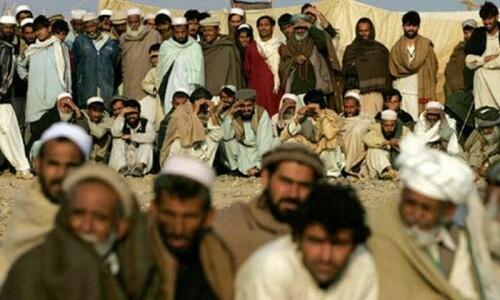GILGIT: The two-day annual International Baba Ghundi Festival concluded in the Chipursan valley of Upper Hunza district near the Pak-Afghan border on Saturday.
It was organised by Chipurson Local Support Organisation in collaboration with Gilgit-Baltistan’s tourism department and Aga Khan Rural Support Programme.
The Chipursan valley is situated 14,000 feet above sea level.
The festival was held at the shrine of Baba Ghundi to pay homage to the Sufi saint for his pioneering role in the spread of Islam in Gilgit-Baltistan. On the occasion, tourists and followers of Baba Ghundi visited his shrine and prayed.
The GB government included the festival in its annual calendar in 2010 and made it a part of events of the International Tourism Day.
A large number of people from Afghanistan’s Wakhan region near the border and different parts of GB attended the festival which is also credited with bringing together the Wakhi speaking people of the two countries.
People of Chipursan and Gojal valleys and Upper Hunza have ancestral cultural ties with the people of Wakhan. They have common Wakhi language and practice common culture.
Participants from Afghanistan travelled on yaks crossing glaciers and mountain peaks for days to reach Hunza which is possible only in summer -- from June to October.
Traditional games like Buzkashi and polo were among the main features of the festival. Wearing local costumes, musicians and dancers performed on the occasion.
Buzkashi and polo competitions were held between GB and Afghan teams.
Artistes from both sides performed common cultural songs and danced on traditional music.
Speaking to participants at the concluding day of the event, Chipurson Local Support Organisation chairman Mohammad Ayub said that the event provided an opportunity to people of both Chipursan and Wakhan to interact and also develop trade links.
The locals have historically been trading with the people of Wakhn for centuries, mostly through barter trade.
The Wakhan valley of Afghanistan’s province Badakhshan is located on the border GB, and it is easier for the residents to visit Chipursan for purchasing goods, rather than going to other parts of Afghanistan.
Farman Karim, a resident of Gojal who has been frequently attending the festival, told Dawn that the people of Chipursan and Wakhan had been carrying out barter trade for centuries.
In summer Kyrgyz traders from Afghanistan cross the Irshad Pass and exchange yaks, sheep and goats with shoes, cloth and garments, kitchen utensils and other products procured from markets in Hunza.
The exchange takes place near the shrine of Baba Ghundi. The event has been held for last many centuries in the last week of September.
The participants demanded of the government to take steps to better communication system in the region.
Published in Dawn, October 3rd, 2016













































